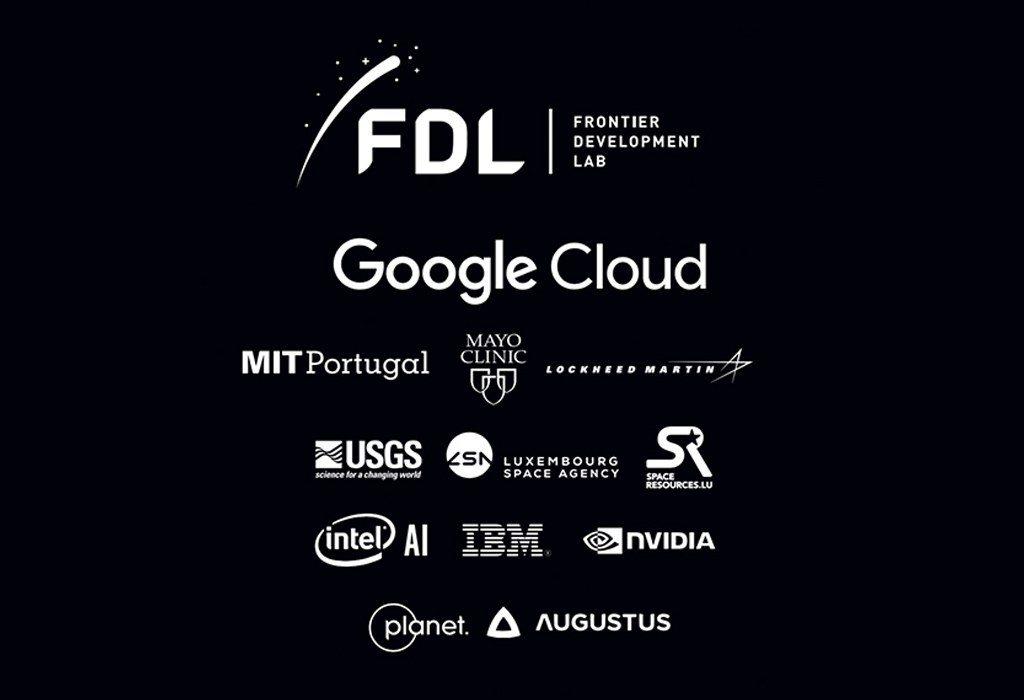
Frontier Development Lab (FDL) – an artificial intelligence research accelerator for space science – kicked off its 2020 program last week on a virtual platform with researchers and faculty from across the globe. Now in its fifth year, the FDL research partnership with NASA and private industry moved to an entirely virtual structure due to the COVID-19 pandemic. Eight US teams with NASA, USGS and private funding, normally hosted at the SETI Institute, and three teams in Europe with ESA funding, normally hosted at Oxford University, are now embarked on research challenges from home that apply AI and machine learning to address critical problems for the benefit of all humankind.
US teams will address questions in heliophysics (the science of the Sun and its relationship with the solar system), Earth science, astronaut health and lunar exploration. You can learn more about their challenges and meet the teams here: https://en.calameo.com/read/004812363ec1e8bdcb314
The teams, comprised of early-career PhDs in AI and interdisciplinary science domains, are supported by subject matter experts from NASA (including NASA Headquarters, NASA Ames Research Center and NASA Marshall Space Flight Center) and the SETI Institute together with FDL Partners: Google Cloud, Mayo Clinic, Lockheed Martin, MIT, USGS, IBM, Intel, Luxembourg Space Agency, NVIDIA, and Planet. Along with expertise, FDL partner organizations support advanced AI research by providing funding, hardware, AI/ML algorithms, datasets, software and cloud-based super-compute resources.
“We celebrate the 5th anniversary of FDL with new partners, including the Mayo Clinic, MIT, USGS and Planet Labs – and new challenges as we enter the uncharted waters of executing FDL in a virtual environment,” said Bill Diamond, President and CEO of the SETI Institute. “We are matching these extraordinary times with extraordinary researchers, faculty, partners and research topics, and once again, we anticipate extraordinary results.”
“One of the important lessons I have learned being in the COVID era is that we have to be creative!” said Madhulika Guhathakurta, from NASA Headquarters. “And in that spirit, the FDL team lost no time to create a Virtual FDL program for 2020 in record time to tackle problems as near and dear to us as human health and as exotic and distant as exo-star systems to understand and predict the behavior of the world we live in.”
FDL has demonstrated the potential of applied AI to deliver game-changing results to the space program, supported by a consortium of motivated partners. This approach has proven critical in unlocking meaningful progress in the complex and often systemic nature of AI problems. FDL firmly adheres to the Presidential Executive Order on Maintaining American Leadership in Artificial Intelligence, which establishes a policy directive for the federal government to sustain and enhance the scientific, technological and economic leadership position of the United States.
Over the last five years, FDL has shown the potential for both scientific discovery and engineering, from predicting GPS scintillation to co-operative robots on the Moon. Additionally, the work informs better, earlier decisions, building maps, super-charging predictions and planning strategies within complex systems.
FDL’s goal is to apply these impressive new capabilities — many of which are emerging in the commercial sector — to problems important to space exploration and humanity.
The work produced by FDL researchers over the past four years has resulted in:
- 26 machine learning workflows
- 10 enhanced data products
- A #1 paper on arXiv in space physics
- A best paper at NeurIPS climate change and AI workshop
- Participation in 30+ scientific and AI conferences
- 12 papers presented at NeurIPS and 6 at AGU in 2019
- More than 60 blogs and articles in major media outlets
Teamwork is core to the FDL process. This year's program is comprised of a diverse group of over 100 researchers located around the world, representing important diversity in nationality, race and gender and more to bring their unique perspectives to this intense and rewarding work of developing cutting edge AI applications for space exploration and humankind.
About the NASA Frontier Development Lab (FDL)
Hosted by the SETI Institute, NASA FDL is an applied artificial intelligence research accelerator developed in partnership with NASA's Ames Research Center. Founded in 2016, the NASA FDL aims to apply AI technologies to challenges in space exploration by pairing machine learning expertise with space science and exploration researchers from academia and industry. These interdisciplinary teams address tightly defined problems, and the format encourages rapid iteration and prototyping to create outputs with meaningful application to the space program and humanity.






